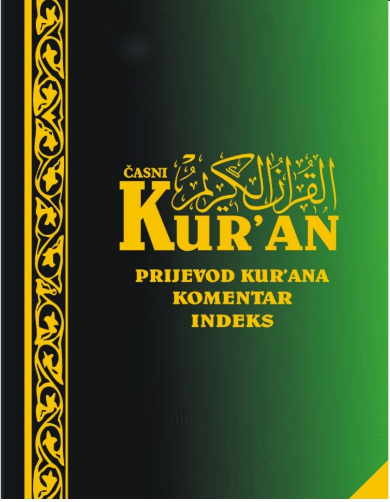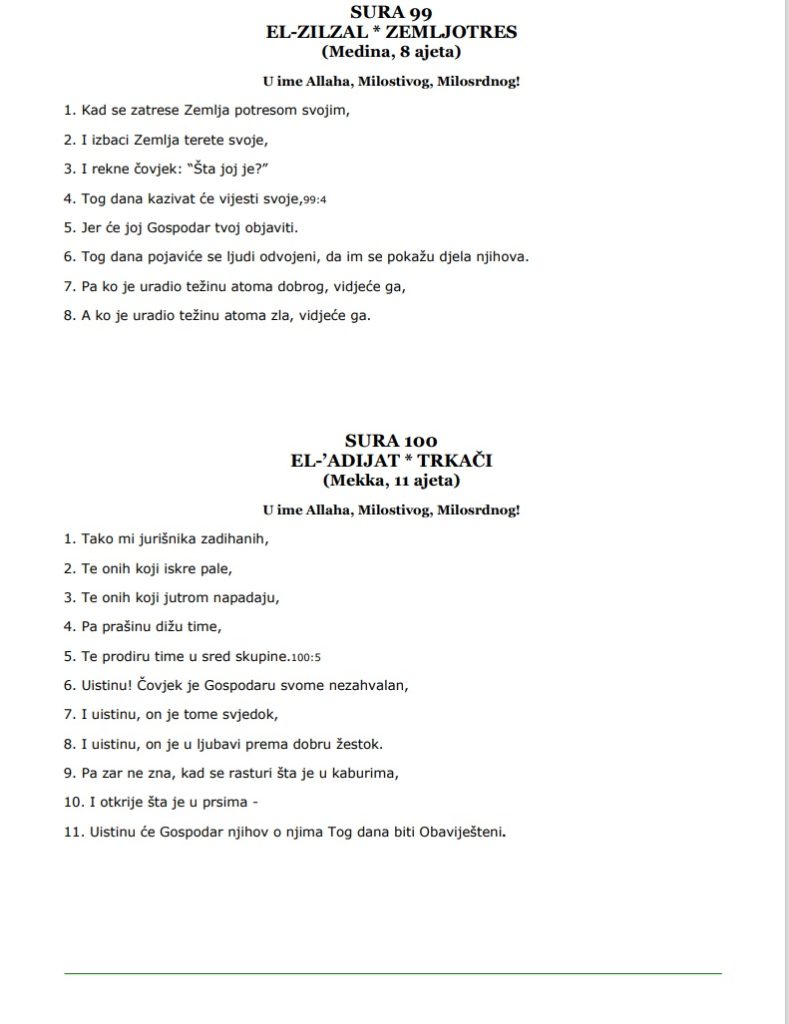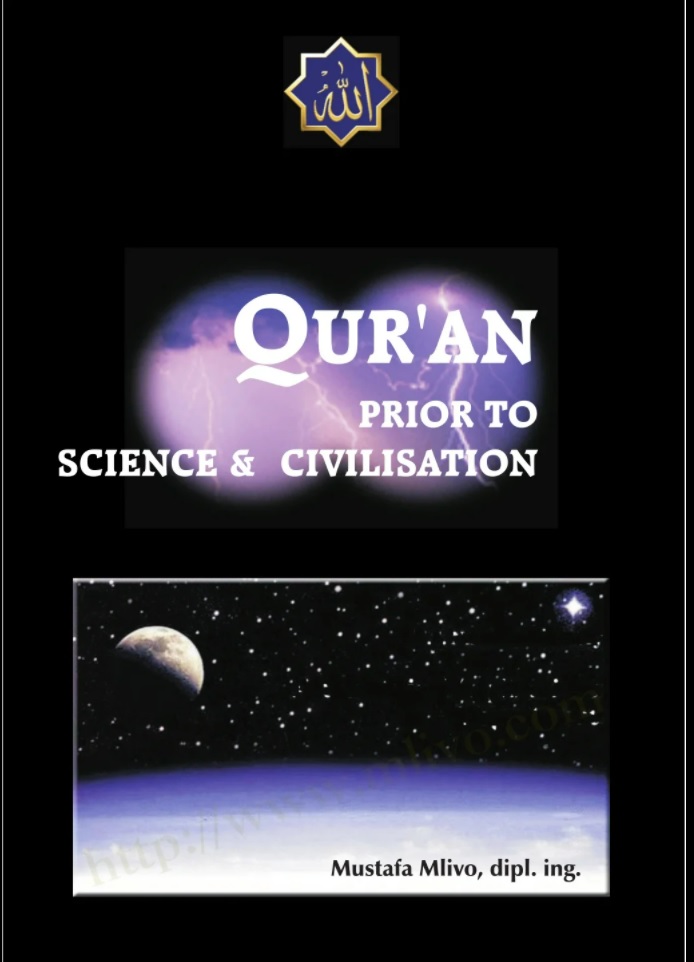Mustafa Mlivo (born 1955) is a writer on Islamic topics from Bugojno, in Bosnia and Herzegovina. He graduated in engineering from Džemal Bijedić University in Mostar and has published several books on Islam and Science (for example, ‘Kur’an ispred nauke i civilizacije’ [2001, Medžlis Islamske zajednice Bugojno], which has been translated into English under the title ‘The Quran Prior to Science and Civilisation’, 1,000 copies of which were also printed in 2001 by the same publisher). In his writings, Mlivo mostly discusses the ‘scientific miracles’ of the Qur’an as well as various issues relating to Qur’anic exegetics and translation. His 2008 ‘101 neispravnost u prijevodima Kur’ana’ (‘101 Mistakes in Translations of the Qur’an’), also published by Medžlis Islamske zajednice Bugojno, is one of only a few books on the topic of Bosnian translations of the meanings of the Qur’an.
“Časni Kur’an” is one of the recent translations of the Qur’an into Bosnian, and is clearly the product of a translator with an Islamic academic background. Mlivo, however, has made considerable efforts to prepare a precise and readable target text. As he himself ambitiously claims: ‘Although it is impossible to make a translation of the Qur’an which is 100% accurate, my goal was to achieve 99% accuracy’. His vocabulary is usually modern and addresses both Muslim and non-Muslim audiences. The additional commentary and notes Mustafa Mlivo provides in addition to the actual text reveals both quite a deep knowledge of Islamic exegetics and familiarity with translations of the meanings of the Qur’an into other languages (English translations, for instance). In most places, Mlivo follows the wording of the Qur’an very strictly and marks his own interpolations with brackets; moreover, many verses are rendered literally and show a great deal of attention to the Arabic source text. Unfortunately, this degree of literalness cannot be really justified in all cases. For instance, when translating Q 56:35, Mlivo writes simply ‘Mi smo ih stvorili stvaranjem’(‘We have created them by creation’), which is not enough clear for the reader.
Another characteristic trait of Mlivo’s rendition is his endeavor to read some verses of the Qur’an (mostly from the Meccan suras) in the light of modern science, primarily astronomy. As a result, his translations of some verses contain elements of scientific terminology. According to this interpretative approach, some Qur’anic verses unambiguously refer to phenomena which have only become known in recent times. This makes Mlivo’s translation unique among Bosnian-language interpretations of the Qur’an. To illustrate this, one may simply consider his interpretation of Q. 55:33: ‘O skupino džinna i ljudi! Ako uzmognete da prodrete iz zona nebesa i Zemlje, tad prodrite! Nećete prodrijeti, izuzev s energijom’(‘O group of jinn and men! If you could penetrate the zone of the heavens and the earth, then penetrate! You will not penetrate, except with energy!’). The word energijom (‘energy’) also occurs in Mlivo’s translation of Q 51:47: ‘A nebo – sazdali smo ga energijom – I uistinu, Mi smo Širitelji’(‘And the heavens – We have created them by means of energy, and, indeed, We it is Who make the vast extent’). Likewise in his translation of the Arabic word ‘dharratin’ fromQ 10:61, Mlivo uses ‘atom’(‘atom’); and for Q 21:33, he opts for ‘orbiti’(‘orbits’) in his translation of ‘falakin yasbaḥūna’. This kind of ‘Bucailleism’ (a term used to refer to the movement to relate modern science with Islam, named after the French surgeon Maurice Bucaille) is a hallmark of his translation, and marks it out from other translations produced in twentieth-century Bosnia.
Another feature of Mlivo’s translation is his widespread use of Arabic terms, many of which he has simply transcribed into Bosnian without explanation or elaboration. From the very first pages of the translation, one encounters dozens of such words in every surah. In Q 2, for example, one finds Kitab, Ahiret, fesad, mufsidi, halif, sedẑda, Dẑennet, zalim, ruku’ among others. In many places, Mlivo uses these terms even though it is very unlikely that their meaning will be understood by ordinary readers (especially a non-Muslim readership). For example, in his rendition of Q 57:14, Mlivo writes ‘A obmanuo vas je o Allahu garur’for ‘wa-gharrakum bi ’Llāhi ’l-gharūru’, maintaining the Arabic ‘gharūr’. In the next verse (15), Mlivo also preserves the Arabic word fidyah: ‘Zato se Danas od vas neće uzeti fidja.’ Despite the fact that many of these Arabic words came into Bosnian via Ottoman Turkish, to modern Balkan readers many of them will be totally unfamiliar.
“Časni Kur’an”has been published at least twice by the translator himself (in 1994, 1995), and once by the local Islamic community in Bugojno (in 2004). Despite the limited number of copies printed and its poor availability in libraries and bookstores in Bosnia and Herzegovina, this work has achieved some degree of popularity. It is accessible on many Islamic websites and is also quoted in some recently printed Islamic books. Thus, to some degree, it competes with the earlier interpretation by Bessim Korkut (1977) and also the later translations by Enes Karić (1995), Esad Duraković (2004) and Nurko Karaman (2019).
Mykhaylo Yakubovych


